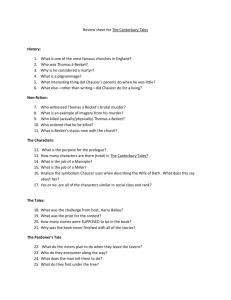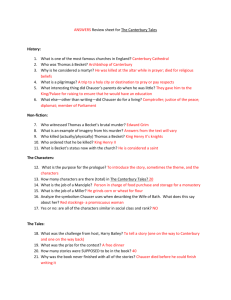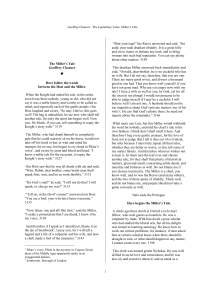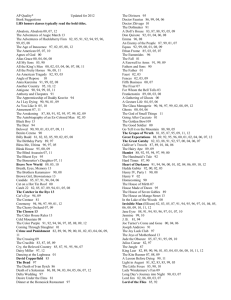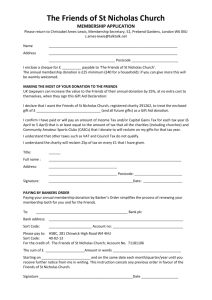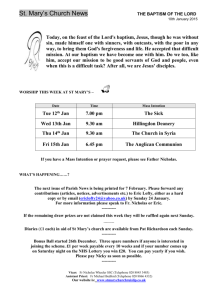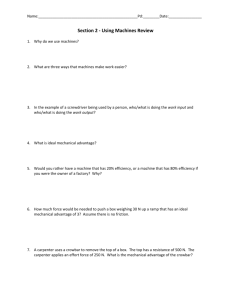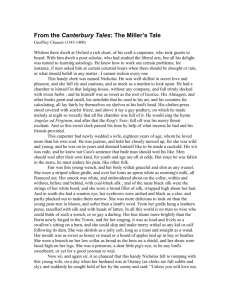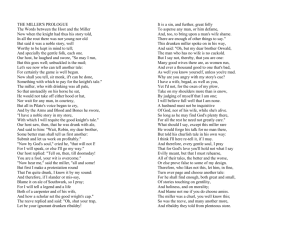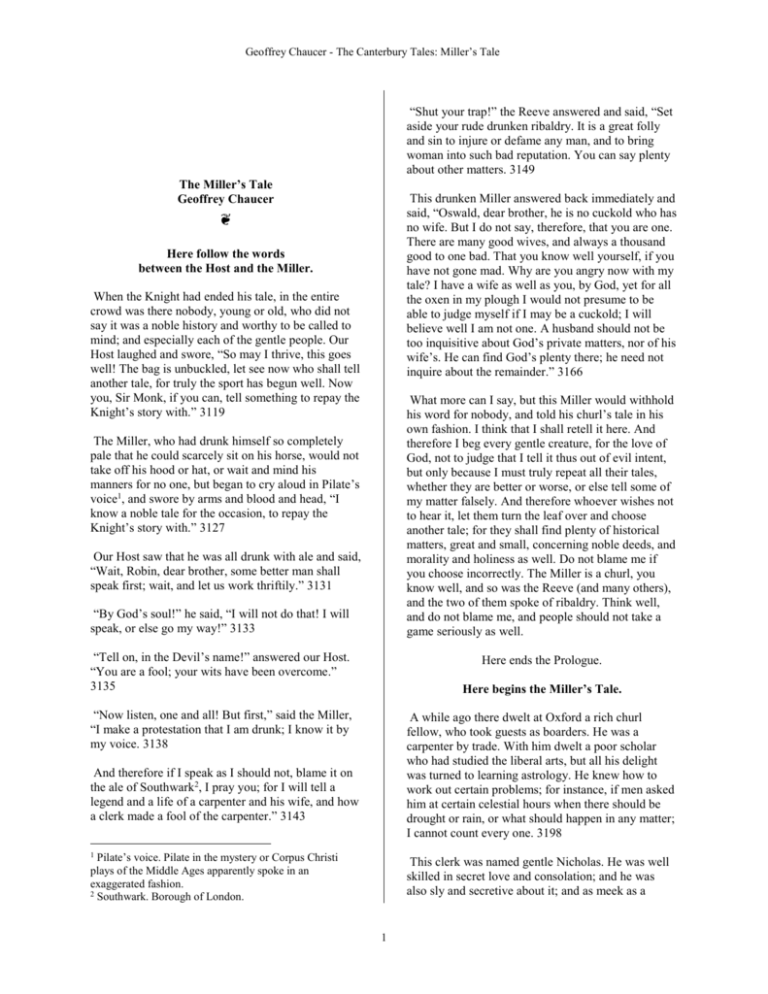
Geoffrey Chaucer - The Canterbury Tales: Miller’s Tale
“Shut your trap!” the Reeve answered and said, “Set
aside your rude drunken ribaldry. It is a great folly
and sin to injure or defame any man, and to bring
woman into such bad reputation. You can say plenty
about other matters. 3149
The Miller’s Tale
Geoffrey Chaucer
This drunken Miller answered back immediately and
said, “Oswald, dear brother, he is no cuckold who has
no wife. But I do not say, therefore, that you are one.
There are many good wives, and always a thousand
good to one bad. That you know well yourself, if you
have not gone mad. Why are you angry now with my
tale? I have a wife as well as you, by God, yet for all
the oxen in my plough I would not presume to be
able to judge myself if I may be a cuckold; I will
believe well I am not one. A husband should not be
too inquisitive about God’s private matters, nor of his
wife’s. He can find God’s plenty there; he need not
inquire about the remainder.” 3166
❦
Here follow the words
between the Host and the Miller.
When the Knight had ended his tale, in the entire
crowd was there nobody, young or old, who did not
say it was a noble history and worthy to be called to
mind; and especially each of the gentle people. Our
Host laughed and swore, “So may I thrive, this goes
well! The bag is unbuckled, let see now who shall tell
another tale, for truly the sport has begun well. Now
you, Sir Monk, if you can, tell something to repay the
Knight’s story with.” 3119
What more can I say, but this Miller would withhold
his word for nobody, and told his churl’s tale in his
own fashion. I think that I shall retell it here. And
therefore I beg every gentle creature, for the love of
God, not to judge that I tell it thus out of evil intent,
but only because I must truly repeat all their tales,
whether they are better or worse, or else tell some of
my matter falsely. And therefore whoever wishes not
to hear it, let them turn the leaf over and choose
another tale; for they shall find plenty of historical
matters, great and small, concerning noble deeds, and
morality and holiness as well. Do not blame me if
you choose incorrectly. The Miller is a churl, you
know well, and so was the Reeve (and many others),
and the two of them spoke of ribaldry. Think well,
and do not blame me, and people should not take a
game seriously as well.
The Miller, who had drunk himself so completely
pale that he could scarcely sit on his horse, would not
take off his hood or hat, or wait and mind his
manners for no one, but began to cry aloud in Pilate’s
voice1, and swore by arms and blood and head, “I
know a noble tale for the occasion, to repay the
Knight’s story with.” 3127
Our Host saw that he was all drunk with ale and said,
“Wait, Robin, dear brother, some better man shall
speak first; wait, and let us work thriftily.” 3131
“By God’s soul!” he said, “I will not do that! I will
speak, or else go my way!” 3133
“Tell on, in the Devil’s name!” answered our Host.
“You are a fool; your wits have been overcome.”
3135
Here ends the Prologue.
Here begins the Miller’s Tale.
“Now listen, one and all! But first,” said the Miller,
“I make a protestation that I am drunk; I know it by
my voice. 3138
A while ago there dwelt at Oxford a rich churl
fellow, who took guests as boarders. He was a
carpenter by trade. With him dwelt a poor scholar
who had studied the liberal arts, but all his delight
was turned to learning astrology. He knew how to
work out certain problems; for instance, if men asked
him at certain celestial hours when there should be
drought or rain, or what should happen in any matter;
I cannot count every one. 3198
And therefore if I speak as I should not, blame it on
the ale of Southwark2, I pray you; for I will tell a
legend and a life of a carpenter and his wife, and how
a clerk made a fool of the carpenter.” 3143
1
Pilate’s voice. Pilate in the mystery or Corpus Christi
plays of the Middle Ages apparently spoke in an
exaggerated fashion.
2 Southwark. Borough of London.
This clerk was named gentle Nicholas. He was well
skilled in secret love and consolation; and he was
also sly and secretive about it; and as meek as a
1
Geoffrey Chaucer - The Canterbury Tales: Miller’s Tale
maiden to look upon. He had a chamber to himself in
that lodging-house, without any company, and
handsomely decked with sweet herbs; and he himself
was as sweet as the root of licorice or any setwall3.
His Almagest4, and other books great and small, his
astrolabe5, which he used in his art, and his countingstones for calculating, all lay neatly by themselves on
shelves at the head of his bed. 3211
plucked out to make them narrow. She was more
delicious to look on than the young pear-tree in
bloom, and softer than a lamb’s wool. From her belt
hung a leather purse, tasseled with silk and with
beads of brass. 3251
In all this world there is no man so wise who could
imagine such a wench9, or so lively a little doll. Her
hue shone more brightly than the noble10 newly
forged in the Tower11. And as for her singing, it was
as loud and lively as a swallow’s sitting on a barn.
And she could skip and make merry as any kid or calf
following its mother. Her mouth was sweet as
honeyed ale or mead, or a hoard of apples laid in the
hay or heather. She was skittish as a jolly colt, tall as
a mast, and upright as a bolt. She wore a brooch on
her low collar as broad as the embossed center of a
shield, and her shoes were laced high on her legs. She
was a primrose, a pig’s-eye12, for a lord to lie in his
bed or even a yeoman to wed. 3270
His clothes-press was covered with a red woolen
cloth, and above it was set a pleasant psaltery6, on
which he made melody at night so sweetly that the
entire chamber was full of it. He would sing the
hymn Angelus ad Virginem7, and after that the King’s
Note8. Often was his merry throat blessed. And so
this sweet clerk passed his time by help of what
income he had and his friends provided. 3220
This carpenter had newly wedded a wife, eighteen
years of age, whom he loved more than his own soul.
He was jealous, and held her closely caged, for she
was young, and he was much older and judged
himself likely to be made a cuckold. 3226
Now sir, and again sir, it so chanced that this gentle
Nicholas fell to play and romp with this young wife,
as clerks are very artful and sly, on a day when her
husband was at Osney13. And secretly he caught hold
of her genitalia and said: “Surely, unless you will
love me, sweetheart, I shall die for my secret love of
you. And he held her hard by the thighs and said,
“Sweetheart, love me now, or I will die, may God
save me!” 3281
His wit was rude, and he didn’t know Cato’s
teaching that instructed that men should wed their
equal. Men should wed according to their own station
in life, for youth and age are often at odds. But since
he had fallen into the snare, he must endure his pain,
like other people. 3232
This young wife was fair, and her body moreover
was as graceful and slim as any weasel. She wore a
striped silken belt, and over her loins an apron white
as morning’s milk, all flounced out. Her smock was
white and embroidered on the collar, inside and
outside, in front and in back, with coal-black silk; and
of the same black silk were the strings of her white
hood, and she wore a broad band of silk, wrapped
high about her hair. 3243
She sprang back like a colt in the halter, and
wriggled away with her head. “I will not kiss you, in
faith,” she said. Why, let me be, let me be, Nicholas,
or I will cry out, ‘Alas! Help!’ Take away your
hands, by your courtesy!” 3287
But this Nicholas began to beg for her grace, and
spoke so fairly and made such offers that at last she
granted him her love and swore by Saint Thomas of
Kent that she would do his will when she should see
her chance. 3293
And surely she had a lecherous eye; her eyebrows
were arched and black as a sloe berry, and partly
“My husband is so jealous that unless you are
secretive and watch your time, I know very well I am
no better than dead. You must be very sly in this
thing.” 3297
3
Setwall. A spice similar to ginger.
Almagest. Ptolemy’s astrological treatise (second century,
Alexandria).
5 Astrolabe. Instrument for measuring the position of
celestial bodies. It has been replaced by the sextant.
Chaucer also wrote a Treatise on the Astrolabe explaining
the use of the instrument.
6 Psaltery. A stringed instrument that was usually set on the
musician’s lap.
7 Angelus ad Virginem. A hymn to Blessed Mother, Mary,
on the event of the Annunciation.
8 King’s Note. Perhaps a reference to the medieval song
“King William’s Note.”
4
9
Wench. Woman of a lower class.
Noble. A coin worth six shillings, eight pence.
11 Tower. The Tower of London, which housed the mint.
12 Primrose, A pig’s-eye, two small flowers.
13 Osney. Town near Oxford.
10
2
Geoffrey Chaucer - The Canterbury Tales: Miller’s Tale
“No, have no fear about that,” said Nicholas. “A
clerk has spent his time poorly if he can not beguile a
carpenter!” 3300
amorous and jolly, until he came to the carpenter’s
house a little after the cocks had crowed, and pulled
himself up by a casement-window. 3360
Dear lady, if your will so be,
I pray you that you pity me 3362
he sang in his sweet small voice, in nice harmony
with his cittern. 3363
And thus they were agreed and pledged to watch for
a time, as I have told. When Nicholas had done so,
petted her well on her limbs, and kissed her sweetly,
he took his psaltery and made melody and played
fervently. 3306
This carpenter woke, heard his song and said without
hesitation to his wife, “What, Alison! Don’t you hear
Absalom chanting this way under our own bedroomwall?” 3367
Then it happened on a holy day that this wife went to
the parish church to work Christ’s own works. Her
forehead shone as bright as day, since she had
scrubbed it when she had finished her tasks. 3311
“Yes, God knows, John,” she answered him, “I hear
every bit of it.” 3369
Now at that church there was a parish clerk named
Absolom. His hair was curly and shone like gold, and
spread out like a large broad fan; its neat part ran
straight and even. His complexion was rosy, and his
eyes as gray as goose-quills. His leather shoes were
carved in such a way that they resembled a window
in Paul’s Church. He went clad precisely and neatly
all in red hose and a kirtle of a light watchet-blue; the
laces were set in it fair and thick, and over it he had a
lively surplice, as white as a blossom on a twig. God
bless me, but he was a sweet lad! 3325
Thus it went on; what would you have better than
well-enough? From day to day this jolly Absalom
wooed her until he was all woe-begone. He remained
awake all night and all day, he combed his spreading
locks and preened himself, he wooed her by gobetweens and agents, and swore he would be her own
page; he sang quavering like a nightingale; he sent
her mead, and wines sweetened and spiced, and
wafers piping hot from the coals, and because she
was from the town he proffered her money. For some
people will be won by rich gifts and some by blows
and some by courtesy. Sometimes, to show his
cheerfulness and skill, he would play Herod on a high
scaffold15. 3384
He knew well how to clip and shave and let blood,
and make a quittance or a charter for land. He could
trip and dance in twenty ways in the manner of
Oxford in that day, and cast with his legs back and
forth, and play songs on a small fiddle. He could play
on his cittern14 as well, and sometimes sang in a loud
treble. In the whole town there was no brew-house or
tavern where any tapster might be that he did not visit
in his merrymaking. But to tell the truth he was
some-what squeamish about farting and rough
speech. 3338
But in such a case what could help him? She so
loved gentle Nicholas that Absalom may as well go
blow the buck’s-horn. For all his labor he had
nothing but scorn, and thus she made Absalom her
ape and turned all his earnest to a joke. This proverb
is true—it is no lie. Men say it is just so: “The sly
nearby one makes the far dear one loathed.” For
though Absalom may go mad for it, because he was
far from her eye, this nearby Nicholas stood in his
light. Now bear yourself well, gentle Nicholas, for
Absalom may wail and sing “Alack!” 3398
This Absalom, so pretty and fine, went on this holy
day with a censer, diligently incensing the wives of
the parish, and he cast many longing looks on them,
and especially on this carpenter’s wife. To look at her
seemed to him a sweet employment, as she was so
sweet and proper and lusty; I dare say, if she had
been a mouse and he a cat, he would have pounced
on her immediately. And this sweet parish-clerk had
such a love-longing in his heart that at the offertory
he would take nothing from any wife; for courtesy,
he said, he would take none. 3351
And so it happened one Saturday that the carpenter
had gone to Oseney, and gentle Nicholas and Alison
had agreed upon this, that Nicholas would create a
ruse to beguile this poor jealous husband; and if the
game went as planned, she should be his, for this was
his desire and hers also. And immediately, without
more words, Nicholas would delay no longer, but had
When at night the moon shone very beautifully and
Absalom intended to remain awake all night for
love’s sake, he took his cittern and went forth,
14
15
Play Herod on a high scaffold. Playing Herod in the
Corpus Christi plays was an honor, as it was one of the
most notable parts in the play cycles, as Herod was a
boisterous madman to whom the audiences responded with
delight.
Cittern. Stringed instrument; predecessor to the guitar.
3
Geoffrey Chaucer - The Canterbury Tales: Miller’s Tale
food and drink for a day or two carried softly into his
chamber, and instructed her say to her husband, if he
asked about him, that she did not know where he
was; that she had not set eyes upon him all that day
and she believed he was in some malady, for not by
any crying out could her maid rouse him; he would
not answer at all, for nothing. 3418
Nicholas sat ever as still as a stone, ever gaping into
the air. This carpenter believed he had fallen into
despair, and seized him mightily by the shoulders and
shook him hard and cried wildly, “What, Nicholas!
What, ho! What, look down! Awake, think on
Christ’s passion; I cross thee16 from elves and
unearthly creatures!” And at that point he said the
night-spell, toward the four corners of the house and
on the outside of the threshold of the door: - 3482
Thus passed forth all that Saturday; Nicholas lay still
in his chamber, and ate and slept or did what he
wished, until Sunday toward sundown. This simple
carpenter had great wonder about Nicholas, what
could ail him. “By Saint Thomas,” he said, “I am
afraid all is not well with Nicholas. God forbid that
he has died suddenly! This world nowadays is so
ticklish, surely; to-day I saw carried to church a
corpse that I saw at work last Monday. Go up, call at
his door,” he said to his boy, “or knock with a stone;
see how it is, and tell me straight.” 3433
Jesus Christ and sweet Saint Benedict
Bless this house from every wicked sprit.
For the night-hag, the white pater noster17;
Where did you go, Saint Peter’s sister18?
3486
At last this gentle Nicholas began to sigh sorely, and
said, “Alack! Shall the entire world be destroyed
again now?” 3489
“What are you saying?” said the carpenter. “What
now! Think on God, as we do, we men that work.”
3491
This boy went up sturdily, stood at the chamberdoor, and cried and knocked like mad: “What! How!
What are you doing, master Nicholas? How can you
sleep all day long?” 3438
“Fetch me a drink,” said Nicholas, “and after I will
speak privately of a certain thing that concerns you
and me both. I will tell it to no other man, you can be
sure.” 3495
But all was for nothing; he heard not a word. Then
he found a hole, low down in the wall, where the cat
would usually creep in; and through that he looked
far into it and at last caught sight of him. 3443
The carpenter went down and came again bringing a
large quart of mighty ale; and when each of them had
drunk his share, Nicholas shut his door fast and set
the carpenter down beside him. 3500
Nicholas sat ever gaping upward as if he were
peering at the new moon. Down went the boy, and
told his master in what plight he saw this man. 3447
The carpenter began to cross himself and said, “Help
us, Saint Frideswide! People know little what shall
happen to them. This man with his astronomy is
fallen into some madness or some fit; I always
thought how it would end this way. Men were not
intended to know God’s secrets. Yes, happy is an
unlearned man that never had schooling and knows
nothing but his beliefs! 3456
“John, my dear host,” he said, “you shall swear to
me here on your honor that you will reveal this secret
to no creature; for it is Christ’s own secret that I show
you, and if you tell it to any you are a lost man. For
this vengeance you will receive, therefore: if you
betray me, you shall run mad!” 3507
“No, may Christ and His holy blood forbid!” said
this simple man. “I am no blabber, and though I say it
myself, I am not wont to prate. Say what you will, I
shall never utter it to man, woman or child, by Him
That harrowed hell19!” 3512
“So fared another clerk with his astronomy; he
walked in the fields to look upon the stars, to see
what was to happen, until he fell into a clay-pit that
he did not see! But yet, by Saint Thomas, I am very
sorry about gentle Nicholas. By Jesus, King of
Heaven, he shall be scolded for his studying if I may.
Get me a staff, Robin, so that I can pry under the
door while you heave it up. I believe we shall rouse
him from his studying!” 3467
16
I cross thee. I give you the sign of the cross. The
Christian tradition is to draw with one’s hand in the air or
over a person or object the shape of a cross, saying “in the
name of the Father, the Son, and the Holy Spirit.
17 The white pater-noster. Variation on the Our Father.
18 Saint Peter’s sister. Not clearly identified.
19 Harrowed hell. When Christ died on Good Friday, he
went to hell to retrieve the souls of all the good people who
had died before him, thus harrowing (raiding or pillaging)
the souls from hell.
And so he went to the chamber door. His boy was a
strong lad, and quickly heaved the door up by the
hinges, and it immediately fell flat upon the floor.
4
Geoffrey Chaucer - The Canterbury Tales: Miller’s Tale
way when the great shower is past - then you will
float as merrily, I will be bound, as the white duck
after her drake. Then will I call out, ‘How, Alison!
How, John! Be merry; the flood will soon pass.’ And
you will answer, ‘Hail, Master Nicholas! Good
morning, I see you well, it is daylight now!’ And then
we shall be lords over the entire world until we die,
just as Noah and his wife! 3582
“Now, John, I will not deceive you,” said Nicholas;
“I have found by my astrology, as I have been
looking in the shining moon, that now a Monday
next, about a quarter through the night, there shall fall
a rain so wild and mad that never was Noah’s flood
half so great. This world shall all be drowned in less
than an hour, so hideous shall be the downpour. Thus
shall all mankind perish in the flood.” 3521
“But one thing I warn you of strictly. Be well
advised on that night when we have entered aboard
ship that none of us speaks a word, neither calls nor
cries, but we must be in our prayers. For that is God’s
own precious command. And your wife and you must
hang far apart, so that there will be no folly between
you, any more in looking than in action. Now that all
this plan is explained to you; go, and may God help
you! Tomorrow at night, when people are all in bed,
we will creep into our kneading-tubs and sit there,
awaiting God’s grace. Go your way now; I have no
time to make a longer sermon of this. Men say thus:
“Send the wise and say nothing.” You are so wise
that there is no need to teach you. Go, save our lives,
I entreat you.” 3600
“Alas, my wife! And shall she drown?” this
carpenter answered, and nearly fell over for sorrow.
“Alas, my Alison! Is there no remedy?” 3525
“Why yes, before God, if you will work according to
wise advising,” said gentle Nicholas; “but you may
not work out of your own head. For thus says
Solomon, and he was right trustworthy, “Work all by
counsel, and you shall never repent.” And if you will
work after good advice, I undertake without mast or
sail to save both her and you and me. Have you not
heard how Noah was saved, when our Lord had
warned him that the entire world should be destroyed
with water?” 3536
“Yes,” said the carpenter, “I heard it long, long ago.”
3537
This simple carpenter went his way often crying
“alack!” and “alas!”, and told the secret to his wife.
And she was wary, and knew better than he what this
quaint plan was about. But nevertheless she acted as
if she would die, and said, “Alas! Go your way at
once and help us to escape, or else we are all lost; I
am your true, faithful wedded wife. Go, dear spouse,
and help to save us! 3610
“Have you not heard also,” said Nicholas, “the woe
that Noah and his sons had before he could get his
wife aboard? He had rather than all his black rams
then, I dare be bound, that she had had a ship all to
herself! Do you know then what is best to do? This
thing calls for haste, and on an urgent matter one may
not preach or delay. Go immediately and get us
directly into this house a kneading-trough or else a
brewing-tub for each of us (but make sure that they
are large), in which we may swim as if in a barge and
have in enough provisions for a day - we will need no
more. The water shall slacken and run off about nine
o’clock on the next day. But Robin your boy must not
know of this, and I cannot save your maid Jill either.
Do not ask why, for even if you ask me I will not tell
God’s secret. It ought to suffice you, if your wits are
not turning, to have as great a grace as Noah had. I
shall save your wife, I promise you. Go your way
now, and make haste. (3562
Lo, how great a thing is feeling! Men may die of
imagination, so deep may the impression be. This
simple fellow began to quake; he thought he could
truly hear Noah’s flood come wallowing like the sea
to drown his honey sweet Alison; he wept, wailed
and made sorrowful expression, and he sighed with
many a sorry gust. He went and got himself a
kneading-trough, and after that a tub and a cask, sent
them secretly to his house and hung them in the roof.
With his own hand he made three ladders, to climb
by the rungs and uprights into the tubs hanging
among the beams; and supplied tub and trough and
cask with bread and cheese as well as good ale in a
large jug, sufficient for a day. But before he had
made all this gear, he sent his serving boy and girl to
London about his business. And as it drew toward
night on the Monday, he lit no candle, but shut the
door and ordered all things as they should be; and, in
brief, up they all three climbed, and sat still while a
man could walk a furlong.3637
“But when you have obtained these three kneadingtubs for us three, then you shall hang them from the
rafters high in the roof, so that no man notice our
device. And when you have done this, and laid our
provisions in them nicely, and an axe as well to strike
the cord in two when the water comes, and when you
have broken a hole on high in the gable toward the
garden over the barn, so that we may freely go on our
5
Geoffrey Chaucer - The Canterbury Tales: Miller’s Tale
“Now mum, and say a pater noster!” said Nicholas;
and “Mum!” said John, and “Mum!” Alison. This
carpenter sat still and said his prayers, ever listening
for the rain, if he could hear it. 3642
and speak to me. You think right little upon my
sorrow, who sweat for your love wherever I go! 3702
No wonder though I languish and sweat! I mourn
like a lamb after the dug. In faith, darling, I have such
love-longing that I mourn like the true turtle-dove. I
cannot eat, no more than a maiden.” 3707
The dead sleep, for very weariness and
apprehension, fell on this carpenter even about
curfew-time or a little later, as I suppose; he groaned
sorely in the travail of his spirit, and eke snored, for
his head lay uneasily. Down the ladder stalked
Nicholas, and Alison sped down very softly; and they
were in mirth and glee, until the bells began to sound
for lauds, and friars in the chancel began to sing.
3656
“Go from the window, Jack-fool,” she said. “On my
soul, there will be no singing “Come kiss me now.” I
love another better than you, by heaven, Absalom,
and else I were at fault. Go your ways, or I will cast a
stone at you, and let me sleep, in the Devil’s name!”
3713
This parish-clerk, amorous Absalom, always so woebegone for love, was at Oseney on that Monday to
amuse himself and make merry, with a party; and by
chance he secretly asked a cloister-monk after John
the carpenter. The monk drew him aside out of the
church. “I know not,” he said; “I have not seen him
work here since Saturday. I believe he has gone
where our abbot has sent him for timber, for he is
accustomed to go for timber and remain at the grange
a day or two. Or else he is at home, certainly. In truth
I cannot say where he is.” 3670
“Alas!” he said. “Alackaday that true love was ever
so ill bestowed! Then kiss me, since it may be no
better, for Jesus’ love, and for the love of me.” 3717
This Absalom grew very merry of heart, and
thought, “Now is the time to wake all night, for
certainly since daybreak I have not seen him stirring
about his door. On my soul, at cockcrow I shall
knock secretly at his window which stands low upon
his chamber-wall. To Alison now will I tell the whole
of my love-longing, and now I shall not fail at the
least to have a kiss from her. I shall have some sort of
comfort, in faith. My mouth has itched all day long;
that is a sign of kissing at least. 3683
And to Nicholas she said silently, “Now hush, and
you shall laugh your fill.” 3722
“Will you then go your way with that?” she said.
3718
“Yes, surely, sweetheart,” said this Absolom. 3719
“Then make yourself ready,” she said, “I am coming
now.” 3720
This Absolom set himself down on his knees and
said, “I am a lord of the highest degree; for after this I
hope there will come more. Sweetheart, your grace,
and sweet bird, your favor!” 3726
She unlatches the window, and does so in haste.
“Take this,” she said, “come now, and move quickly,
lest our neighbors see you.” 3729
All night eke I dreamed I was at a festival. Therefore
I will go sleep an hour or two, and then I will wake
all night in mirth.” 3686
This Absolom wiped his mouth dry. Dark as pitch, or
as coal, was the night, and at the window she put out
her hole, and Absolom, who knew no better or worse
but with his mouth he kissed her naked ass so
sweetly, before he was aware of this. 3735
When the first cock had crowed, up rose this frisky
lover, and arrayed him in his gayest with all nicety.
But first he chewed cardamoms and licorice to smell
sweetly, before he had combed his hair, and put a
true-love charm under his tongue, for by this he
hoped to find favor. He rambled to the carpenter’s
house, and stood still under the casement, which was
so low it reached to his breast. He gave a soft halfcough,-”What do you, sweet Alison, honeycomb 20?
My fair bird, my darling! Awake, sweet cinnamon,
He started aback, and thought something was amiss,
for well he knew a woman has no beard. He felt
something all rough and long-haired, and said, “Fy!
alas! What have I done?” 3739
“Tee hee!” she said, and shut the window, and
Absolom went forth with troubled steps. 3741
“A beard! A beard!” said handy Nicholas, “By God’s
body, this goes fair and well.” 3743
20
Honeycomb. Some of the language in this speech is
borrowed from the Biblical Song of Songs.
6
Geoffrey Chaucer - The Canterbury Tales: Miller’s Tale
This foolish Absolom heard every bit, and on his lips
he began to bite angrily, and said to himself, “I shall
pay you back.” 3746
knocked withal upon the window, as he did before.
3789
“Who is there that knocks so?” Alison answered. “I
warrant it a thief!” 3791
Who rubs now, and who chafes now, his lips with
dust, with sand, with straw, with cloth, with chips,
but Absolom, who says over and over, “Alas! I
commend my soul unto Satan”? But I would rather be
revenged for this insult” he said, “than own this
entire town. Alas,” he said, “alas, that I did not turn
aside!” 3753
“Why nay,” he said, “God knows, my sweet, I am
your Absalom, my sweetheart. I have brought you a
ring of gold; my mother gave it me, on my life! It is
very fine and nicely engraved. I will give you this, if
you kiss me!” 3797
His hot love was now cold and entirely quenched; for
from that moment that he had kissed her ass, he cared
not a straw for things of love, for he was healed of his
sickness21. Often the things of love he defied, and
wept as does a child that is beaten. 3759
This Nicholas had risen to take a piss, and he
thought he would contribute to the joke; he should
kiss him before he ran off! And he threw up the
window in haste and quietly put his ass out, past the
buttocks, all the way to the thigh-bone. Thereupon
spoke this clerk Absalom, “Speak, sweet bird, I know
not where thou art.” This Nicholas then let fly a fart
as great as a thunder-clap, so much so that with the
stroke Absalom was almost blinded; and he was
ready with his hot iron and smote Nicholas on the
ass. 3810
This Absalom walked slowly across the street to a
smith called Master Gervase, who forged ploughinstruments at his forge. He was busily sharpening
coulter and share22 when Absalom knocked very
gently and said, “Unlock the door, Gervase, and do it
quickly.” 3765
Off went the skin, about a hands-breadth around, the
hot coulter burned his rump so, and for the pain he
thought he would die. “Help! Water, water! Help,
help, for God’s sake!” he cried like a madman. 3815
“What! Who are you?” 3766
“It is me, Absalom.” 3766
“What, Absalom! By the cross, why are you up so
early? Eh, God bless! What ails you? Some pretty
girl, God knows, has brought you to stir so early. By
Saint Neot23, you know well what I mean!” 3771
The carpenter started out of his slumber; he heard
one cry wildly “Water!”, and thought, “Alas! Noah’s
flood is coming now!” He sat up without a word, and
with his axe struck the cord in two, and down went
tub and all; they stopped for nothing until they came
to the floor, and there he lay in a swoon. 3823
This Absalom cared not a peascod for all his
mocking, and returned not a word in kind. He had
more wool on his distaff24 than Gervase knew, and
said, “Dear friend, that hot coulter in the chimney-lend it to me. I have something to do with it; and I
will bring it you again right away. 3778
Up started Alison and Nicholas, and cried “Help!”
and “Alack!” in the street. The neighbors young and
old ran to stare upon him as he lay yet in a swoon, for
with the fall he had broken his arm. 3829
“Surely,” answered Gervase, “even if it were gold or
nobles in a bag all uncounted, you should have it, as I
am a faithful smith! Eh, the Devil, what do you want
to do with it?” 3781
But he must even digest his own trouble, for when
he spoke he was talked down by Alison and gentle
Nicholas. They told every man he was mad, he was
aghast so of “Noah’s flood” in his fantasy, that of his
folly he had bought him three kneading-tubs and had
hung them above in the roof; and had prayed them
for God’s sake to sit with him in the roof, to keep him
company. 3839
“That is as it may be,” said Absalom. I shall tell you
tomorrow;” and he took up the coulter by the cool
handle. Softly he went out the door and went to the
wall of the carpenter’s house. He coughed first, and
People laughed at his odd quirk; into the roof they
peered and gawked, and turned all his trouble into
mirth. For whatever the carpenter answered, it was all
for naught; no man heard his speeches, he was so
sworn down by the great oaths of the others that in
the entire city he was held as mad. Every clerk then
21
Sickness. I.e., his love-sickness.
Coulter and share
23 St Neot. A saint of Glastonbury.
24 More wool on his distaff. I.e., more troubles on his mind.
22
7
Geoffrey Chaucer - The Canterbury Tales: Miller’s Tale
agreed with every other clerk: “the man is mad, my
dear brother!” And every creature laughed over this
contention. 3849
Thus the carpenter lost his wife, for all his watching
and jealousy; and Nicholas was sore burned. This tale
is done, and God save the entire company. 3854
Here ends the Miller’s Tale. 3854
Translated and Edited by Gerard NeCastro
© Copyright, 2007, All Rights Reserved
Citation. Chaucer, Geoffrey. The Miller’s Tale. NeCastro,
Gerard, ed. and trans. eChaucer:
http://www.umm.maine.edu/faculty/necastro/chaucer
8

